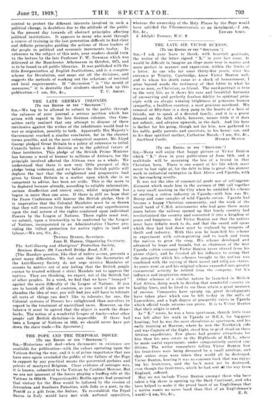THE LATE GERMAN COLONIES.
[To THE EDITOR Or THE " SPECTATOR:9 SIR,—We beg to be allowed to submit to the public through the columns of your journal a serious position which has arisen with regard to the late German colonies. Our Com- mittee early realized that any attempt to dispose of these territories against the wishes of the inhabitants would lead to war or migration, possibly to both. Apparently His Majesty's Government reached a similar conclusion, for in the clearest terms possible, and in the most categorical manner, Mr. Lloyd George pledged Great Britain to a policy of reference to tribal Councils before a final decision as to the political future of these territories. This pledge of the British Prime Minister has become a word of honour to millions of Africans, for the principle involved affected the African race as a whole. We understand that there is now very little prospect of this Pledge being redeemed, and we believe the British public will deplore the fact that the enlightened and progressive lead given by Great Britain in a matter upon which she is so competent to advise, has been set aside. This is the more to be deplored because already, according to reliable information, serious disaffection and unrest exist, whilst migration has begun in more than one area. if there is still no hope that the Peace Conference will honour the British pledge, then it is imperative that the Colonial Mandates must be so drawn that they will remove from the native mind any apprehension upon the real nature of the rights conferred upon individual Powers by the League of Nations. Those rights must rest, we submit, upon a trusteeship to be conferred by the League of Nations, incorporated in an Administrative Charter pro- viding the fullest protection for native rights in land and labour.—We are, Sir, &e., TRAVERS BUXTON, Secretary.
Denison House, 296 Vauxhall Bridge Road, S.W. 1.
[The Mandate question, like that of native assent, presents a great many difficulties. We feel sure that the Secretaries of the Anti-Slavery Society do not urge stricter Mandates or assents by natives out of any .feeling that the British people cannot be trusted without a strict Mandate not to oppress the natives. They are thinking, we expect, not of the British but of ether peoples. In a word, we find that we have " bumped " against the main difficulty of the League of Nations. If you are to banish all idea of coercion, as you must if you are to abandon the idea of war, you will find you will have to tolerate all sorts of things you don't like to tolerate; for one, the Colonial systems of Powers less enlightened than ourselves in regard to the treatment of uncivilized races. However, on the balance it must be agreed that the object is worth the draw- backs. Thiinotion of a wonderful League of Amity—what other
people' call British dictation—is impossible. If there had been a League Of -Nations in 1816, we should never have put down the slave trade.—ED. Spectator.]






































 Previous page
Previous page